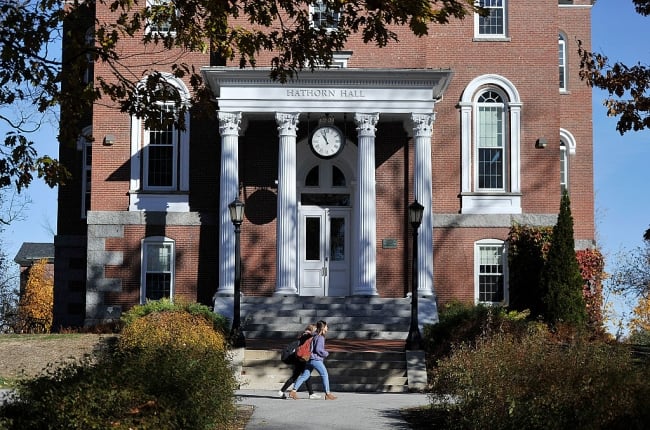You have /5 articles left.
Sign up for a free account or log in.

Bates College is one of five institutions that will receive money from the Schuler Education Foundation this year.
Portland Press Herald/Contributor/Getty Images
The Schuler Education Foundation recently doled out tens of millions of dollars to a handful of liberal arts colleges to expand access for underserved students at their institutions. The money comes as a challenge grant, which will require the institutions to raise matching funds over a period of years to double the investment.
The 20-year-old foundation has long focused on supporting liberal arts students, said Jason Patenaude, executive director and chief operating officer at Schuler. Now, it’s supporting the colleges that educate them.
“We realized a few years ago that we could also move up the value chain a little bit and support these schools directly,” Patenaude said. “Because if we want to make sure that students get the opportunity to experience this great education, you need to make sure that those colleges are financially stable, and that they have the seats available for low-income or undocumented students so that these students can attend.”
Five institutions -- Bates College, Carleton College, Kenyon College, Tufts University and Union College -- have received grants via the foundation’s Schuler Access Initiative. Eventually, the foundation hopes to distribute $500 million to as many as 25 liberal arts colleges to recruit and enroll more undocumented and Pell Grant-eligible students.
Letters to the Editor
A reader has submitted
a response to this article.
You can view the letter here,
and find all our Letters to
the Editor here.
All five institutions are predominantly white and located in the Midwest and Northeast.
Pell Grant eligibility is often used as a proxy for low-income status. The percentage of first-time undergraduate students that receive Pell Grants at each institution currently ranges from 9 percent at Kenyon and Bates to 16 percent at Union, recent data from the National Center for Education Statistics showed.
The foundation selected the first five institutions because they showed a history of supporting low-income students, according to Patenaude.
“We wanted to work with schools that we felt had shown a real commitment to supporting low-income and undocumented students but had maybe not had the resources to accept as many as they wanted to just because they couldn’t afford to,” he said.
This is the case at Union, a private college in Schenectady, N.Y., that is set to receive $20 million from the foundation, the college announced Tuesday. The college aims to raise another $20 million over the next five years to meet the foundation’s matching grant, for a total investment of $40 million.
“Union is one of fewer than 100 schools that meets full demonstrated need,” said David Harris, president of the college. “That means that we get to a point where we just don’t have more financial aid money, and so we can’t admit exceptional students who need financial aid.”
The college has already raised about $3 million and received lots of interest from board members and other donors, Harris said.
Union enrolls about 2,000 undergraduate students, including about 75 Pell Grant-eligible students in each class, according to a college press release. During the 2022-23 and 2023-24 academic years, the Schuler investment will allow the college to increase that total by nine students each year. In subsequent years, the college will add 10 Pell Grant-eligible students.
The initiative is particularly exciting for Harris, who received a Pell Grant when he attended college.
“I know firsthand what it’s like to think, ‘Can I attend this school? Can I afford it?’ And then to see that -- thanks to the generosity of others and the government as well -- ‘I actually can,’” Harris said. “I've been excited to be able to extend that opportunity to others.”
Bates, a private college in Lewiston, Me., received a $50 million challenge grant from the foundation, tasking the institution with raising an additional $50 million for a total $100 million investment. The college had already raised $30 million in pledges and matching gifts prior to the public announcement Tuesday.
The college hopes to increase the number of students who are Pell Grant eligible, undocumented and low income by 50 percent over the next decade.
Bates enrolls about 1,870 undergraduate students. During the 2019-20 academic year, 47 first-year students received Pell Grants, according to NCES data.
“This is a game changer for Bates,” Clayton Spencer, president of Bates, said in a statement. “Bates was founded by people who believed in the power of education to develop the full potential of every human being. This extraordinary investment from the Schuler Education Foundation, combined with the generosity of Bates donors, provides us with the means to renew this founding vision in a very real and tangible way. I am thrilled that we will be able to make the life-transforming experience of the liberal arts available to even greater numbers of talented students who might otherwise not have this opportunity.”
Carleton, a private college in Northfield, Minn., will receive a $50 million matching grant, a college spokesperson said Tuesday. If the college raises enough to match the grant, the endowed fund will total $100 million. (This paragraph has been updated to state that Carleton could receive $50 million from the foundation.)
The Schuler Education Foundation is still deciding which liberal arts colleges will be included for the next round of grants, Patenaude said. College officials at interested institutions can reach out to the foundation for consideration.
“The colleges that we work with are going to get a tremendous amount of value from increasing the representation at their schools for underrepresented students, for low-income students and for undocumented students,” Patenaude said. “We want that benefit to happen as quickly as possible.”








